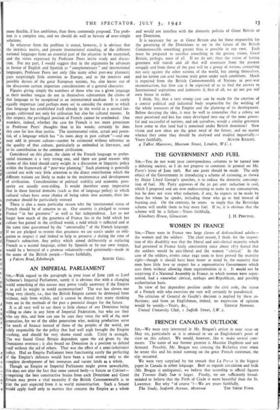AN IMPERIAL PARLIAMENT
SIR,—With regard to the paragraph in your issue of June tzth re Lord Selbome's Imperial Parliament, surely it is obvious that with a changing world something of this nature may prove vitally necessary if the Empire is to pull its weight in world reconstruction? The war has shown one thing very clearly, i.e., that the British Empire cannot be destroyed from without, only from within, and it cannot be denied that many thinking men see in the methods of the past a potential danger for the future.
It is all very well to say there is little chance of any Dominion being willing to share in any form of Imperial Federation, but who are they who say this, and how can one be sure they voice the will of the new generation, for we of the older generation who, making production serve the needs of finance instead of those of the peoples of the world, are solely responsible for the policy that had well nigh brought the Empire crashing, and should for very shame stand aside. Unity is strength. The war found Great Britain dependent upon the aid given by the Dominions overseas ; it also found no Dominion in a position to defend itself without the aid of others. That was the effect of a semi-isolationist policy. Had an Empire Parliament been functioning surely the perfecting of the Empire's defences would have been a task second only to the complete development of her resources and vacant lands as a whole.
Though an Empire or Imperial Parliament might prove unworkable, this does not alter the fact that some central body—a Senate or Cabinet- omprising the best constructive brains from each Dominion and Great ritain may prove a vital necessity if the British Commonwealth is to lay the part expected from it in world reConstruction. Such a Senate ould apply itself only to matters that concern the Empire as a whole and would not interfere with the domestic policies of Great Britain or any Dominion. It is necessary for us in Great Britain ana for those responsible for the governing of the Dominions to see in the future of the British Commonwealth something greater than is possible in our own. Each must be prepared to sacrifice something to the greater vision, Great Britain, perhaps, most of all. If we do not, then the vision of lasting greatness will vanish and all that will eventuate from the present struggle and from those of the past will be a group of nations competing not only against the other nations of the world, but among themselves, and no nation can ever become truly great under such conditions. Much is expected from the British Commonwealth of Nations in post-war reconstruction, but how can it be expected of us to find the answer to International aspirations and jealousies if, first of all, we do not put out own house in order.
I think, Sir, that a very strong case can be made for the creation of a central political and industrial body responsible for the welding of the whole resources of the Empire and the planning of its development. Before decrying the idea, it may be well to remember that a colony we once possessed and lost has since developed into one of the most power- ful and successful of nations, and ask ourselves, would a similar greatness have come to that land had it remained under British dominion? New vision and new ideas are the great need of the future, and no matter whence they come they should be analysed and studied impartially.—


























 Previous page
Previous page